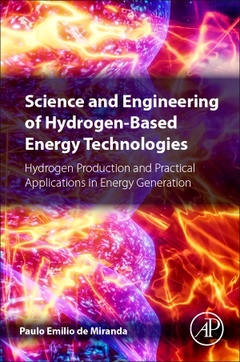Science and Engineering of Hydrogen-Based Energy Technologies Hydrogen Production and Practical Applications in Energy Generation
Coordonnateur : Miranda Paulo Emilio

Science and Engineering of Hydrogen-Based Energy Technologies explores the generation of energy using hydrogen and hydrogen-rich fuels in fuel cells from the perspective of its integration into renewable energy systems using the most sound and current scientific knowledge.
The book first examines the evolution of energy utilization and the role expected to be played by hydrogen energy technologies in the world?s energy mix, not just for energy generation, but also for carbon capture, storage and utilization. It provides a general overview of the most common and promising types of fuel cells, such as PEMFCs, SOFCs and direct alcohol fuel cells. The co-production of chemical and electrolysis cells, as well as the available and future materials for fuel cells production are discussed. It then delves into the production of hydrogen from biomass, including waste materials, and from excess electricity produced by other renewable energy sources, such as solar, wind, hydro and geothermal. The main technological approaches to hydrogen storage are presented, along with several possible hydrogen energy engineering applications.
Science and Engineering of Hydrogen-Based Energy Technologies?s unique approach to hydrogen energy systems makes it useful for energy engineering researchers, professionals and graduate students in this field. Policy makers, energy planning and management professionals, and energy analysts can also benefit from the comprehensive overview that it provides.
1. Hydrogen Energy 2. Fuel Cells 3. Potential of hydrogen production from biomass 4. Energy Storage Using Hydrogen Produced from Excess Renewable Electricity: Power to Hydrogen 5. Hydrogen Energy Engineering Applications and Products 6. Regulatory Framework, Safety Aspects and Social Acceptance of Hydrogen Energy Technologies 7. Road Mapping 8. Market, Commercialization, and Deployment of Hydrogen Energy Technologies
- Presents engineering fundamentals, commercially deployed technologies, up-and-coming developments and applications through a systemic approach
- Explores the integration of hydrogen technologies in renewable energy systems, including solar, wind, bioenergy and ocean energy
- Covers engineering standards, guidelines and regulations, as well as policy and social aspects for large-scale deployment of these technologies
Date de parution : 11-2018
Ouvrage de 438 p.
15x22.8 cm
Thème de Science and Engineering of Hydrogen-Based Energy... :
Mots-clés :
<; P>; fuel cells; renewable energy; PEM fuel cells; solid oxide fuel cells; high temperature fuel cells; electrolysis cells; cogeneration; direct alcohol fuel cells; carbon capture and storage; carbon capture and utilization; CCS; CCU; biohydrogen; biomass; biofuels; bioenergy; solar energy; wind energy; ocean energy; energy storage; hydrogen storage; power to gas; fuel cell vehicles; CHP; hydrogen infrastructure; total owner cost; engineering standards; engineering codes; social aspects; policy<; /P>



